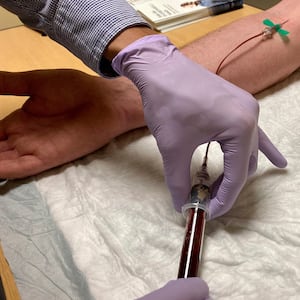Health
Blood Tests Show Potential in Early Cancer Detection Breakthrough

Recent advancements in cancer detection have emerged from a study published in Cancer Discovery this March, revealing that blood tests may accurately identify signs of cancer years before a formal diagnosis. This research highlights the potential for early intervention, which is crucial for improving treatment outcomes in cancer patients.
The study indicates that certain blood tests can detect trace amounts of genetic material released by tumors. This genetic material may be present up to three years before patients are aware of their cancer diagnoses. The findings suggest that these multi-cancer early detection tests could significantly enhance screening processes, allowing for timely medical responses.
Several start-up companies have developed various versions of these innovative tests. They are designed to identify the unique genetic signatures associated with over a dozen types of cancer. Some medical practices have already begun to implement these technologies, demonstrating a growing interest in the potential of blood-based cancer screening.
Despite the promising results, the journey from research to widespread clinical application remains complex. Experts emphasize the need for large-scale studies to validate the effectiveness and reliability of these tests in diverse populations. These studies will help to ascertain how best to integrate these tools into everyday medical practice.
The initial enthusiasm surrounding these technologies has been matched by a sense of caution. While the ability to detect cancer at such an early stage is groundbreaking, further research is essential to address any potential limitations and to standardize procedures for their use in clinical settings.
As the field of cancer detection evolves, the integration of these blood tests into routine screenings could revolutionize how healthcare professionals approach cancer diagnosis and treatment. The hope is that, in the near future, a simple blood test could provide invaluable insights, leading to earlier interventions and improved patient outcomes.
-

 World1 week ago
World1 week agoPrivate Funeral Held for Dean Field and His Three Children
-

 Top Stories2 weeks ago
Top Stories2 weeks agoFuneral Planned for Field Siblings After Tragic House Fire
-

 Sports3 months ago
Sports3 months agoNetball New Zealand Stands Down Dame Noeline Taurua for Series
-

 Entertainment3 months ago
Entertainment3 months agoTributes Pour In for Lachlan Rofe, Reality Star, Dead at 47
-

 Entertainment2 months ago
Entertainment2 months agoNew ‘Maverick’ Chaser Joins Beat the Chasers Season Finale
-

 Sports3 months ago
Sports3 months agoSilver Ferns Legend Laura Langman Criticizes Team’s Attitude
-

 Sports4 weeks ago
Sports4 weeks agoEli Katoa Rushed to Hospital After Sideline Incident During Match
-

 World2 weeks ago
World2 weeks agoInvestigation Underway in Tragic Sanson House Fire Involving Family
-

 Politics2 months ago
Politics2 months agoNetball NZ Calls for Respect Amid Dame Taurua’s Standoff
-

 Top Stories2 weeks ago
Top Stories2 weeks agoShock and Grief Follow Tragic Family Deaths in New Zealand
-

 Entertainment3 months ago
Entertainment3 months agoKhloe Kardashian Embraces Innovative Stem Cell Therapy in Mexico
-

 World4 months ago
World4 months agoPolice Arrest Multiple Individuals During Funeral for Zain Taikato-Fox














